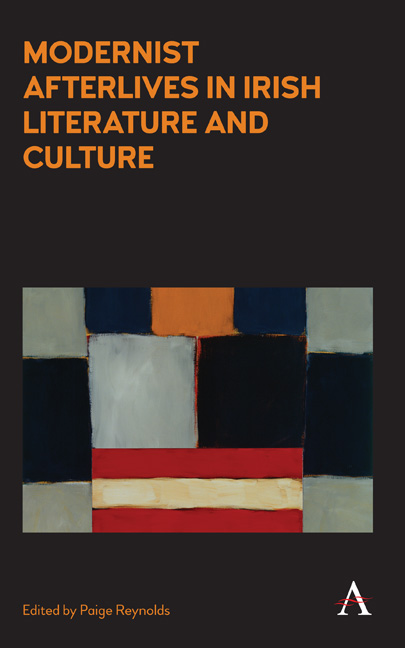Book contents
- Frontmatter
- Contents
- List of Figures
- Acknowledgements
- Introduction
- Section One LITERATURE AND LANGUAGE
- Chapter 1 ‘A World of Hotels and Gaols’: Women Novelists and the Spaces of Irish Modernism, 1930–32
- Chapter 2 ‘I Knew What It Meant / Not to Be at All’: Death and the (Modernist) Afterlife in the Work of Irish Women Poets of the 1940s
- Chapter 3 ‘Whatever Is Given / Can Always Be Reimagined’: Seamus Heaney's Indefinite Modernism
- Chapter 4 James Joyce and the Lives of Edna O'Brien
- Chapter 5 Modernist Topoi and Late Modernist Praxis in Recent Irish Poetry (with Special Reference to the Work of David Lloyd)
- Chapter 6 ‘Amach Leis!’ (Out with It!): Modernist Inheritances in Micheál Ó Conghaile's ‘Athair’ (‘Father’)
- Section Two INSTITUTIONS, ART AND PERFORMANCE
- Afterword: The Poetics of Perpetuation
- Notes on Contributors
- Index
Chapter 5 - Modernist Topoi and Late Modernist Praxis in Recent Irish Poetry (with Special Reference to the Work of David Lloyd)
from Section One - LITERATURE AND LANGUAGE
Published online by Cambridge University Press: 22 July 2017
- Frontmatter
- Contents
- List of Figures
- Acknowledgements
- Introduction
- Section One LITERATURE AND LANGUAGE
- Chapter 1 ‘A World of Hotels and Gaols’: Women Novelists and the Spaces of Irish Modernism, 1930–32
- Chapter 2 ‘I Knew What It Meant / Not to Be at All’: Death and the (Modernist) Afterlife in the Work of Irish Women Poets of the 1940s
- Chapter 3 ‘Whatever Is Given / Can Always Be Reimagined’: Seamus Heaney's Indefinite Modernism
- Chapter 4 James Joyce and the Lives of Edna O'Brien
- Chapter 5 Modernist Topoi and Late Modernist Praxis in Recent Irish Poetry (with Special Reference to the Work of David Lloyd)
- Chapter 6 ‘Amach Leis!’ (Out with It!): Modernist Inheritances in Micheál Ó Conghaile's ‘Athair’ (‘Father’)
- Section Two INSTITUTIONS, ART AND PERFORMANCE
- Afterword: The Poetics of Perpetuation
- Notes on Contributors
- Index
Summary
‘There are the Alps’, wrote Basil Bunting of Pound's Cantos : ‘you will have to go a long way round / if you want to avoid them’. For Irish poets at mid-century, no less than for the Northumbrian Bunting, modernism proved an unavoidable massif – even, or perhaps especially, when they wrote out of a sceptical or even antagonistic response to it, as in the cases of Padraic Fallon and Austin Clarke. More recently, certain Irish poets one would scarcely identify with a Poundian ‘Other Tradition’ have engaged more profitably with modernism than Fallon and Clarke, as in Seamus Heaney's ventriloquism of Joyce in the closing section of ‘Station Island’, and Derek Mahon's recurrent return to the scene of the modern by means of his evocation of ‘the Men of 1914’ in ‘A Kensington Notebook’, The Golden Bough in ‘The Last of the Fire Kings’, an avant-garde precursor in ‘An Image from Beckett’ and, more generally, the exilic preoccupations of ‘Ovid in Tomis’. Such ‘citation’ of modernism, however, stands in marked contrast to the late modernist practice one finds in the work of certain contemporary Irish poets who, in various ways, have chosen to position their work in the slipstream of the stylistic experimentation of high modernism, including Trevor Joyce, Geoffrey Squires, Maurice Scully, Billy Mills and Catherine Walsh. In this chapter, I read the poetry of David Lloyd as illustrating a similarly productive appropriation of earlier modernist praxes, as distinct from the thematically significant deployment of modernist topoi one witnesses in, for example, Mahon and Heaney.
In the early 1950s, Padraic Fallon contributed a ‘Journal’ to The Bell : a series of candid and, on occasion, caustic commentaries on recent and contemporary poetry. In an entry dated 8 December 1951, he writes:
Pound's Cantos were built to express the whole vision of the poet by using all his material. In that they were successful. He uses an art-form in which he can be mythic and moronic in the same space of a line. He can be stately and slummy, cryptic, gnomic and diffusive on the one page. Pound found an art-form for the whole man by chucking his early love of the stanzaic form for a medium that gave him any freedom he required in dealing with any kind of material. Il miglior fabbro? I think so.
- Type
- Chapter
- Information
- Modernist Afterlives in Irish Literature and Culture , pp. 61 - 74Publisher: Anthem PressPrint publication year: 2016



